
The Expanding Role Of
African Women In Harnessing
Carbon Markets
Many African countries are in the process of understanding how to harness the opportunities provided by carbon markets, with the broader aim of financing and fulfilling their Nationally Determined Contributions (NDCs). Carbon markets, which have quadrupled in transaction value over the last two years, support climate change mitigation by creating economic incentives to reduce emissions while supporting a transition towards a low carbon, climate resilient global economy. But as Ahunna Eziakonwa, UNDP Under Secretary General, told an audience of African women leaders at COP27: ‘’If we do not focus on the contribution of women in this fight, we shall loose the battle. Putting women at the forefront of decision-making processes is what is going to do it for a decarbonized world.’’
Indeed, a UN-REDD event held at the Sharm el-Sheikh Climate Change Conference in November, 2022 heard from a number of African women leaders on progress being made in their countries to align with carbon market opportunities.
In Uganda, for example, a multi-sectoral taskforce has been established to assess and implement a strategy with respect to carbon markets and implementation of NDCs. ‘’Every day, I get a request to join the taskforce, the first of its kind with expertise in finance, green bonds and a number of ways to channel resources to implement on NDCs,” said Margeret Mwebesa, Commissioner for Uganda’s Ministry of Water and Environment. “Uganda has high hopes for action to take place. Indeed, we even have the participation of our Central Bank, the Bank of Uganda.’’
In Ghana, the Carbon Fund has issued the country’s first Results-based Payment, providing an opportunity to advance its approaches and to apply for the REDD+ Environmental Excellence Standard to verify reductions. Furthermore, REDD+ strategy implementation is underway with a program run by UNDP and the Global Shea Alliance to restore degraded savannah forests and shea landscapes. This is in addition to deliberate efforts to build the capacity of women stakeholders in Ghana.
According to climate focus consultant, Nsikan-George Emana, women and gender concerns are being represented in the implementation of NDCs, but there is a need for rapid, targeted capacity building. Mirey Atallah, Head of UNEP’s Climate for Nature branch and UN-REDD Programme partner, discussed the need for developed countries to channel Results-based Payments to developing countries without continuously changing the rules of the game, creating new rules or raising the bar on various mechanisms to access to climate finance, as this is eroding trust.
In order to bridge the divide between finance and African countries’ aspirations, countries need to demonstrate the value of Nature-based Solutions and put together strategies to unlock various streams of finance. “Trust must be the basis for harnessing carbon markets in Africa,” said Eziakonwa. The role of women in decision-making circles is key to bringing a human face to decarbonization and to successfully negotiating the future.

